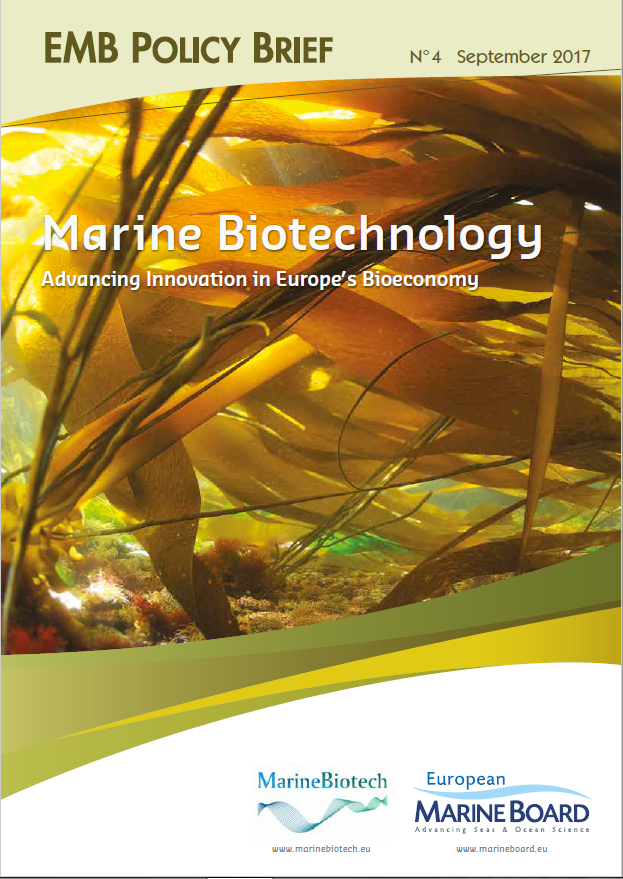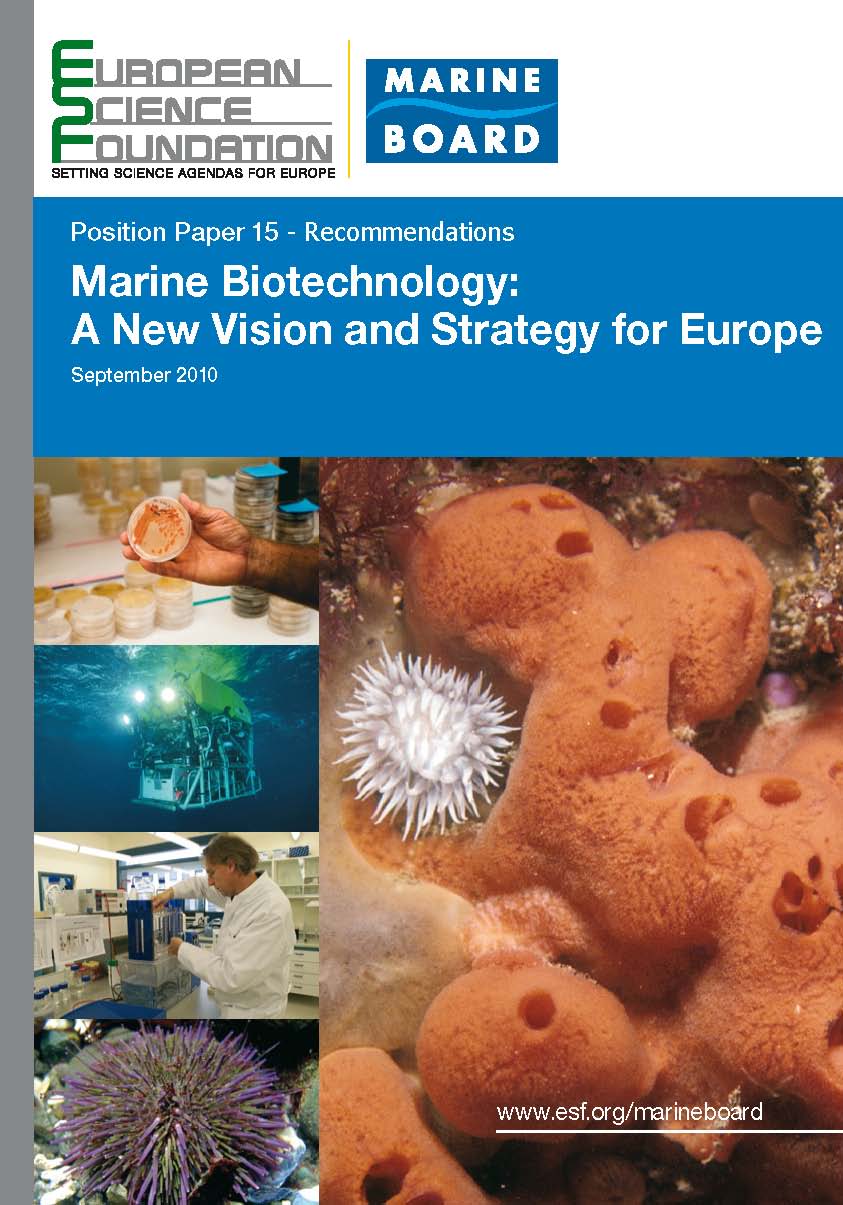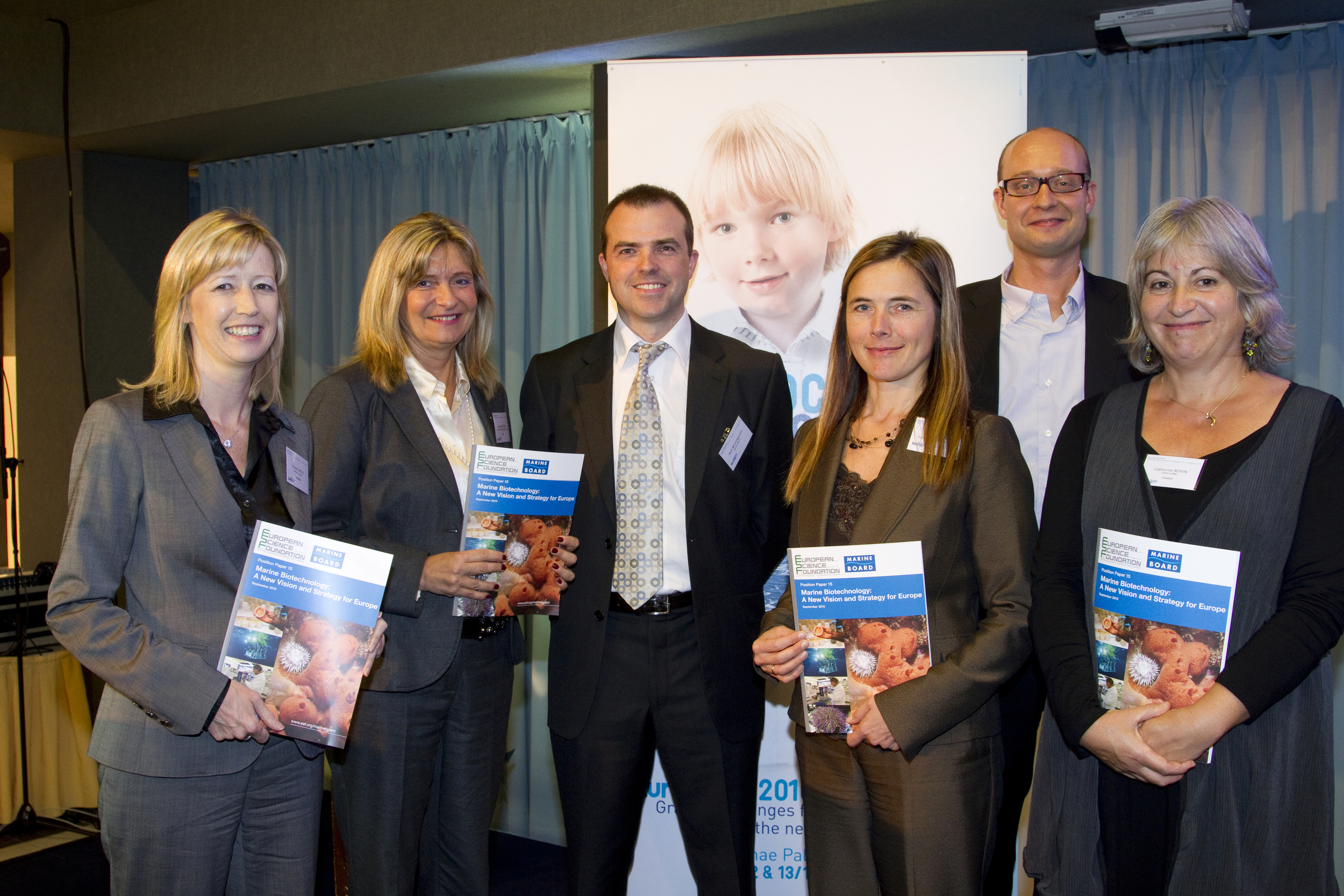Output
P olicy Brief 4, Marine Biotechnology: Advancing Innovation in Europe’s Bioeconomy (September 2017)
olicy Brief 4, Marine Biotechnology: Advancing Innovation in Europe’s Bioeconomy (September 2017)
News release and news article for the publication (September 2017)
Impact report for the publication (September 2019)
 Position Paper 15, Marine Biotechnology: a Vision and Strategy for Europe (September 2010)
Position Paper 15, Marine Biotechnology: a Vision and Strategy for Europe (September 2010)
 Position Paper 4, Marine Biotechnology: A European Strategy for Marine Biotechnology (December 2001)
Position Paper 4, Marine Biotechnology: A European Strategy for Marine Biotechnology (December 2001)
EMB Science Webinar on Unlocking Marine Genetic Resources (September 2022)
EMB Science Webinar on Marine biotechnology to advance Europe's bioeconomy (August 2022)
Background
 Since our first Position Paper on Marine Biotechnology (2001), the scientific and political backgrounds of marine biotechnology have been deeply modified. If the main changes in marine biotechnology during the nineties were the result of the molecular biology revolution, it clearly appears that in R&D the main driving force during the last decade was the genomic revolution. The overwhelming role of marine biodiversity for the future of marine resources, ecosystem management, bioprospecting and marine biotechnology was also fully recognized.
Since our first Position Paper on Marine Biotechnology (2001), the scientific and political backgrounds of marine biotechnology have been deeply modified. If the main changes in marine biotechnology during the nineties were the result of the molecular biology revolution, it clearly appears that in R&D the main driving force during the last decade was the genomic revolution. The overwhelming role of marine biodiversity for the future of marine resources, ecosystem management, bioprospecting and marine biotechnology was also fully recognized.
Despite significant achievements, European countries are now facing a global crisis and numerous challenges among which the need to develop more environmental friendly processes in various industries, the need to cope with the increasing demand of novel drugs and more generally have no choice but to stay competitive at international level. How marine biotechnology can contribute at minima to maintain and best to increase European competitiveness is therefore an even more relevant question nowadays than ten years ago.
 In 2017, EMB worked together with ERA-Net on Marine Biotechnology (ERA-MBT) to produce a Policy Brief 4 on Marine Biotechnology: Advancing Innovation in Europe’s Bioeconomy. The Policy Brief draws content from the ERA-MBT Marine Biotechnology Strategic and Innovation Roadmap: Insights to the future direction of European marine biotechnology, published in 2016, and assesses the latest advancements in marine biotechnology across five thematic areas identified by the ERA-NET roadmap, including long-term (2020-2030) opportunities where significant scientific, technological and other challenges remain. It also adds further value by highlighting the continuing need for fundamental marine research and knowledge of marine ecosystems at the top of the biotechnology value chain. The Policy Brief also summarizes latest updates from this emerging Blue Growth sector and presents examples of commercial applications of marine biotechnology, the resulting high-value products and services and examples of other European projects and initiatives that are seeking to streamline the marine biotechnology pipeline.
In 2017, EMB worked together with ERA-Net on Marine Biotechnology (ERA-MBT) to produce a Policy Brief 4 on Marine Biotechnology: Advancing Innovation in Europe’s Bioeconomy. The Policy Brief draws content from the ERA-MBT Marine Biotechnology Strategic and Innovation Roadmap: Insights to the future direction of European marine biotechnology, published in 2016, and assesses the latest advancements in marine biotechnology across five thematic areas identified by the ERA-NET roadmap, including long-term (2020-2030) opportunities where significant scientific, technological and other challenges remain. It also adds further value by highlighting the continuing need for fundamental marine research and knowledge of marine ecosystems at the top of the biotechnology value chain. The Policy Brief also summarizes latest updates from this emerging Blue Growth sector and presents examples of commercial applications of marine biotechnology, the resulting high-value products and services and examples of other European projects and initiatives that are seeking to streamline the marine biotechnology pipeline.
EMB Working Group (2008-2010)
Objective
- Analyze European progress in Marine Biotechnology since publication of the first Marine Board Position Paper on Marine Biotechnology (2001);
- Identify the barriers restricting progress in the development of Marine Biotechnology and its application to the various activities from energy to aquaculture, environmental science and biomedicine;
- Review recent literature with a focus on innovation in key technologies, trends and emerging paradigms;
- Propose improved procedures and identify future R&D needs.
- Propose recommendations for actions.
Related activities
- Marine Biotechnology ERA-NET Final Conference: “Oceans of Opportunities”, 20-21 November 2017 – Oslo (Norway)
Meetings
- 22 September 2009, Brussels, Belgium
- 18–19 March 2010, Brussels, Belgium
Members
Chair: Joel Querellou, French Research Institute for Exploitation of the Sea (Ifremer), France
Working Group members:
Torger Børresen, International institute of Aquaculture Resources (DTU aqua), Denmark
Catherine Boyen, CNRS Station Biologique, France
Alan Dobson, Environmental Research Institute (UCC), Ireland
Manfred Höfle, Helmholtz Center of Infection Research, Germany
Adrianna Ianora, Ecophysiology Laboratory Stazione Zoologica “A. Dohrm” Naples, Italy
Marcel Jaspars, Aberdeen University, UK
Anake Kijjoa, University of Porto, Portugal
Jan Olafsen, Universtiy of Tromsø, Norway
George Rigos, Hellenic Centre of Marine Research (HCMR), Greece
René Wijffels, Wageningen University and Research Centre (Wageningen UR), Netherlands
Additional Contribution from:
Chantal Compère, French Research Institute for Exploitation of the Sea (Ifremer), France
Michel Magot, IBEAS, France
Jeanine Olsen, University of Groningen, Netherlands
Philippe Potin, CNRS, France
Filip Volckaert, University of Leuven, Belgium
Contact at European Marine Board Secretariat: Ángel E. Muñiz Piniella Email